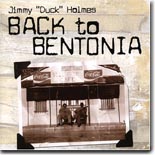 One of the most unique
styles of blues, the haunting Bentonia Blues from Central Mississippi,
was only played by a few musicians native to the area. Skip James is
probably the best known of these musicians, but he passed away in 1969.
One of his counterparts, Jack Owens, continued the tradition until his
death in 1997, and it was thought that the sound passed with him.
One of the most unique
styles of blues, the haunting Bentonia Blues from Central Mississippi,
was only played by a few musicians native to the area. Skip James is
probably the best known of these musicians, but he passed away in 1969.
One of his counterparts, Jack Owens, continued the tradition until his
death in 1997, and it was thought that the sound passed with him.
However, Owens began
teaching a local musician, Jimmy “Duck” Holmes, the style. Holmes
owned the local Blue Front Café, which is now a well-known juke joint in
the Bentonia area, and was already a formidable guitarist. Under the
guidance of Owens, he blossomed as a country blues guitarist, but except
for a handful of recordings, he remained virtually unknown.
Fortunately for blues fans
everywhere, the new Broke and Hungry Records label was able to get
Holmes into the recording studio, and the result, Back To Bentonia,
is one of the most stunning country blues releases of the year.
Holmes covers only a couple
of songs from the James/Owens catalog; the haunting “I’d Rather Be The
Devil,” which still raises goose bumps, and a pleasing version of “Hard
Times.” He also does an interesting take on Little Brother Montgomery’s
“Vicksburg Blues,” with an assist from Sam Carr (one of three tracks the
legendary drummer appears on).
The remainder of the disc
is comprised of original tunes from Holmes, guaranteeing the
continuation of the Bentonia sound into the 21st century.
Holmes’ own compositions stand up well to the songs of his predecessors,
especially the title cut, which sounds like it would have been a perfect
fit on James’ Paramount recordings in the 1930s. Vocally, his tone is
not as high or mournful as Owens or James, but is actually more
versatile. On some songs, his gravelly delivery is reminiscent of a
young Honeyboy Edwards.
Further linking past and
present, harmonica player and longtime Owens collaborator Bud Spires
also joins Holmes on several tracks, even providing vocals for the
closing track, “Your Buggy Don’t Ride Like Mine.”
Recorded in two separate
sessions, at the Blue Front Café and at Jimbo Mathus’ Delta Recording
Studio in Clarksdale, Back To Bentonia is sheer nirvana for fans
of country blues and most especially the Bentonia variety.
--- Graham Clarke
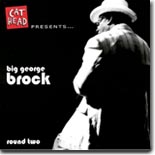 After an extended absence
from recording, Big George Brock received a lot of attention last
year with his debut release for Cat Head Records, Club Caravan. A
year later, he continues his hot streak with his anticipated follow-up,
Round Two, which should be a welcome treat for fans of the blues
the way they were played in the ’50s, raw and unvarnished.
After an extended absence
from recording, Big George Brock received a lot of attention last
year with his debut release for Cat Head Records, Club Caravan. A
year later, he continues his hot streak with his anticipated follow-up,
Round Two, which should be a welcome treat for fans of the blues
the way they were played in the ’50s, raw and unvarnished.
A native of Mississippi,
Brock worked in the fields during the week and boxed on the weekends,
and also played the blues in the Clarksdale area (Big Jack Johnson is
his brother-in-law and James “Super Chikan” Johnson is his nephew).
Moving to St. Louis in the 50’s, Brock owned several blues clubs and his
band, the Houserockers was the house band at Cimmie’s Western Inn for
over a decade. Brock has played with Muddy Waters, Howlin’ Wolf, Jimmy
Reed, Big Bad Smitty, Willie Foster, and many others over his career.
Round Two features
12 tracks, along with a spoken-word intro from Brock that only lasts a
few seconds. The music kicks off with a Brock original, “So Long.” At
seven-plus minutes, it’s a blues fan’s dream with plenty of mournful
harmonica from Brock and lots of tasty guitar contributed by Hubert
Sumlin.
Seven of the tracks are
Brock originals, plus a snippet at the end of the disc. The originals
are written in the classic style of ’50s era blues, such as “No No Baby”
and “Mattson Blues,“ and “Arkansas to Memphis”, but some have a few
modern twists, such as the witty “Mr. Wal-Mart.”
Brock covers a couple of
tunes made popular by Sumlin’s former boss, Howlin’ Wolf, as well, “Poor
Boy” and “Shake For Me“ (featuring more inspired guitar from Sumlin). He
also tackles Sonny Boy Williamson’s “Sugar Mama,” and the classic
spiritual “Burden Down.”
Along with Sumlin, Brock
receives solid support from Bill Abel (guitar), Levan Lortkipanidze
(keyboard), Ben Wells (drums), and Lightnin’ Malcolm (bass, drums,
guitar). The production by Roger Stolle (“live” in the studio with no
overdubs) gives the disc the authenticity of those great blues
recordings from times gone by.
Round Two is an
excellent set of down-home blues from a seasoned veteran who‘s making up
for lost time.
--- Graham Clarke
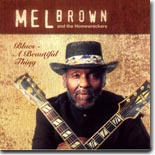 Guitar legend Mel
Brown’s first studio release in five years is the appropriately
titled Blues – A Beautiful Thing (Electro-Fi). Brown’s resumé is
impressive, featuring appearances on stage or in the studio with Bobby
Bland, B.B. King, Etta James, Albert Collins, Snooky Pryor, and many
others, as well as several critically acclaimed solo releases in the
late ’60s and his recent excellent output with Electro-Fi. The common
denominator in all of Brown’s work has always been his tasteful, jazzy
guitar. In fact, tasteful restraint is the key to Brown’s music. He
never overplays his hand and always leaves you wanting to hear more.
Guitar legend Mel
Brown’s first studio release in five years is the appropriately
titled Blues – A Beautiful Thing (Electro-Fi). Brown’s resumé is
impressive, featuring appearances on stage or in the studio with Bobby
Bland, B.B. King, Etta James, Albert Collins, Snooky Pryor, and many
others, as well as several critically acclaimed solo releases in the
late ’60s and his recent excellent output with Electro-Fi. The common
denominator in all of Brown’s work has always been his tasteful, jazzy
guitar. In fact, tasteful restraint is the key to Brown’s music. He
never overplays his hand and always leaves you wanting to hear more.
In a change from his
previous Electro-Fi studio album, Neck Bones & Caviar, Brown
penned nine of the 11 songs. The only covers are a funky instrumental
version of Stevie Wonder’s ’80s hit, “Master Blaster,” and “I Wouldn’t
Treat A Dog,” a nod to his longtime employer Bland.
Of the remaining nine
tracks, four are instrumentals, all featuring Brown’s exquisite guitar
work. He is also a talented keyboardist, too, and doubles up on keys and
guitars for the title track. The remaining instrumentals (“Snap,”
“Sundown,” and “Karansa’s Boogie”) demonstrate why Brown’s name should
be listed among the elite blues guitarists. The beauty of these
instrumental tracks is enough reason for blues guitar fans to purchase
the disc.
On the other tracks, Brown
supplements his fretwork with serviceable vocals, the highlights being
“Take Your Time,” “Ruby Mae,” and his reprise of a track he co-wrote
with his father from one of his earlier releases, “Red Cross Store,”
would make Lightnin’ Hopkins smile.
The funk-driven “I Wanna
See My Baby” is also a highlight, though it’s marred somewhat by Brown’s
cartoonish growling vocal, while “Make Love To Your Mind,” is a mellow
track which puts Brown’s keyboard skills on full display.
To borrow a phrase from
football coach Bum Phillips, as far as guitarists go, Mel Brown may not
be in a class by himself, but it sure doesn’t take long to call the
roll. Blues fans will find a lot to love about this disc. If you’re not
already of fan of Mel Brown’s, prepare to join the ranks.
--- Graham Clarke
2005 was a big year for
Alvin Jett & the Phat NoiZ Blues Band. The St. Louis band tore up
the road at various blues festivals in their home state of Missouri,
Illinois, Iowa, and the Pacific Northwest, in addition to their usual
200 shows a year. Even better, the band was one of the finalists at the
2006 International Blues Challenge, and last year’s debut release,
Wet My Beak, was in the final five for Best Self-Produced CD.
Striking while the iron is hot, Jett and the band up the ante with their
latest release, Milk and Cookies, which is an even better album
than their previous effort.
Specializing in high-energy
blues, the band stands out for several reasons, the first being the
interaction between guitarist/vocalist Jett and saxman/vocalist Frank
Bauer. Listening to this CD made me realize what a rarity it is to hear
a saxophone in a blues band these days and in Bauer’s capable hands, the
sax becomes almost a co-lead instrument and his contributions play a
huge role in the distinctiveness and quality of the band’s sound.
Jett’s guitar work shows
the influence of such diverse talents as Albert King, Jimi Hendrix, and
Carlos Santana, but Jett combines all that into his own, original
package, rocking hard on the opening cut, “Boogie To The Blues,” and the
scorching title cut, then slowing things down with “My Baby’s Place” and
“Angel Sings The Blues,” where his blues-drenched fretwork takes on a
jazzy resonance at times.
Other highlights include
“Down In The Delta,” which memorializes the band’s trip to play at the
Arkansas Blues & Heritage Festival in Helena, and features Bauer on
vocals (he also sings on “Ain’t Been The Same”), and “7:47 Central
Time,” a propulsive instrumental which features some sparkling interplay
between Jett and Bauer, who are pushed hard by the rhythm section of
Matt Davis (bass) and Jeremy West (drums). Davis also gets a turn at
vocals on “Best Friend You Ever Had.” In fact, the vocals by Bauer and
Davis give even more dimension to an already diverse band.
Arthur “Mississippi”
Williams adds his idiosyncratic harp to a couple of tracks, including
“Down In The Delta,” which also features slide guitar from fellow St.
Louis musician Rich McDonough.
A definite crowd-pleaser,
Milk and Cookies should keep Alvin Jett & the Phat NoiZ Blues
Band’s momentum going and add to their ever-growing list of admirers. Go
to
www.phatnoiz.com for more
information about this great up-and-coming band.
--- Graham Clarke
The Danish
blues band, Lightnin’ Moe, continues to impress with their
hard-driving blues and R&B on their latest release, Rock ‘N’ Roll
Baby (Blue Rocket Records), and show that they are keeping the blues
alive half a world away.
Instrumentally, the band has always been on the mark with their
interpretation of American blues, and their last couple of releases have
featured more original compositions by singer/harmonica player Morten
“Lightnin’ Moe” Stenbaek. Stenbaek’s harp is exceptional and his vocals
continue to improve with each release.
Highlights
include the opening track, “You Never Can Tell,” a Chicago-style
shuffle, the rock & roll beat of the title cut and “Show You My Love,”
the soulful “Let The Conscience Be Your Guide,” and “Talk Is Cheap,” one
of many tracks featuring the scorching guitar of Kasper “Lefty” Vegeberg.
“Crying Over You” slows things down effectively, but the instrumental
“Astatic Bullet” kicks things back into full speed.
The album’s
lone cover is “Forgetting You,” on which Stenbaek makes a valiant effort
at duplicating James Carr’s soulful original version.
The rhythm
section of Tim Lothar Petersen (drums) and Peter “The Planet” Dunvad
(bass) keep things rolling along with their solid backing. Rock ‘N’
Roll Baby rocks harder than the band’s previous releases and the
band seems to be comfortable with this change. Look for this enjoyable
disc at
www.pacificblues.com.
--- Graham Clarke
Tim
Lothar Petersen has been a busy man lately. Over the past couple of
years, the drummer for the Danish band Lightnin’ Moe, has been locked
away in his spare time learning to play guitar. One listen to his debut
release, Cut To The Bone, and you will realize that he’s learned
his lessons well…very well indeed.
Petersen
cut this disc, a collection of Delta blues, at his home, and wrote seven
of the ten tracks, playing acoustic guitar and singing unaccompanied.
The cover tunes are Charley Patton’s “High Sheriff Blues,” Leadbelly’s
“Bound To Go,” and Willie Brown’s “M & O Blues,” and Petersen does a
very good job on each of them. Wisely, he doesn’t try to imitate them
vocally, opting instead to sing them his own voice.
The
original compositions range from the gentle “Don’t Hesitate,” to
“Katrina,” a haunting look at the devastating storm that may be the
highlight of the disc, and “Amalina,” a pretty instrumental dedicated to
Petersen’s daughter.
Throughout,
Petersen displays a surprisingly deft touch on guitar (surprising, given
the fact that he’s only recently started playing), and his vocals are
mannered, but confident. There’s no question that this style of music is
very dear to Petersen’s heart. It’s obvious with every note he plays and
sings.
Cut To
The Bone is a very pleasant surprise and fans of acoustic blues will
definitely enjoy it. Go to
www.timlothar.com
and give this one a listen.
--- Graham Clarke
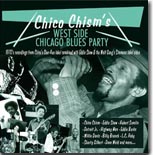 Chico Chism's Westside Chicago Blues
Party (Southwest Musical Arts Foundation Records) is a reissue of
material, originally recorded or produced by drummer Chico Chism
in Chicago during 1978-79 and released on various 45's and one LP at the
time, that is just now seeing the light of day on CD, thanks to producer
and Arizona blues-ologist Bob Corritore.
Chico Chism's Westside Chicago Blues
Party (Southwest Musical Arts Foundation Records) is a reissue of
material, originally recorded or produced by drummer Chico Chism
in Chicago during 1978-79 and released on various 45's and one LP at the
time, that is just now seeing the light of day on CD, thanks to producer
and Arizona blues-ologist Bob Corritore.
Roughly half of the disc's 15 cuts feature
the late Howlin' Wolf's backing band, Eddie Shaw and the Wolf Gang, with
the remainder featuring lesser-known artists such as harpist Eddie Burks
and Wolf-stylist "Highway Man." Chico himself plays drums on most cuts
and acted as producer on four of them, including his own "Coo Fannie
Coo," on which he sings lead.
Aside from the all-star talent contained
within the ranks of the Wolf Gang (including guitarist Hubert Sumlin and
the late, great piano-pounder, Detroit Junior), we also get
accompaniment from harpist Billy Branch and future Little Ed sideman
Dave Weld on guitar, so you know up front that the name-of-the-game is
no-nonsense, real-deal blues (no funkadelic versions of "Mustang Sally"
will be found here!).
Thanks to Bob Corritore and to the main
man himself, Chico Chism, for making this wonderful music available
again.
--- Lee Poole
Another recent reissue of older material with a Phoenix connection is
The Soul Side of the Street: Hot Phoenix Soul, sides from the vaults of
Hadley Murrell, 1964-1972, compiled by Arizona's resident music
historian John Dixon and released on the Burbank-based Dionysus label.
Messr. Murrell was a concert promoter and record producer here in
Phoenix and L.A. back in the '60s and '70s, and "Johnny D" has assembled
a collection of rare 45's and previously-unreleased sides from what must
have been quite a thriving R&B scene.
The most recognizable names included herein would probably be the duo of
Eddie & Ernie (Phoenix's answer to Sam & Dave, who now enjoy a CD of
their own on the British Ace label), and saxophonist-vocalist Bobby
Soul (who still occasionally performs around town), but the obscurity of
these artists should not be taken as indicative of their talent. Indeed,
one of the then-local guitarists who appears on these sides, Pete Cosey,
went on to become a studio musician at Chess Records in Chicago, and to
play with Miles Davis on some of the jazz great's fusion albums of the
'70s.
While there's not much in the way of "blues" per se on this disc,
there's plenty of soul shoutin', vocal group harmonies, and funky
instrumental jams to be enjoyed by fans of the genre. Many thanks to
"Doctor" Dixon for bringing this sweet soul music back from the vaults
and onto our CD players.
--- Lee Poole
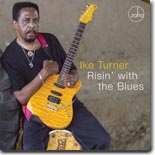 Through much of his career as a bandleader and entrepreneur, Ike
Turner employed top-notch vocalists, ranging from Jackie Brenston
and Billy Gayles in the early days of the Kings of Rhythm to, of course,
Tina Turner. Ike preferred to let others take the vocals and for good
reason ... he really never had the pipes. That's my complaint with
Turner's new CD, Risin' with the Blues (Zoho Roots) ... I'd like
it a lot better if someone else was singing. Make no mistake --- Turner
is still a great bandleader, arranger and slashing guitarist. But he
can't really sing. His raspy voice lacks range and tone.
Through much of his career as a bandleader and entrepreneur, Ike
Turner employed top-notch vocalists, ranging from Jackie Brenston
and Billy Gayles in the early days of the Kings of Rhythm to, of course,
Tina Turner. Ike preferred to let others take the vocals and for good
reason ... he really never had the pipes. That's my complaint with
Turner's new CD, Risin' with the Blues (Zoho Roots) ... I'd like
it a lot better if someone else was singing. Make no mistake --- Turner
is still a great bandleader, arranger and slashing guitarist. But he
can't really sing. His raspy voice lacks range and tone.
Not
surprisingly, my favorite cuts on this disc are the instrumentals: the
appropriately named "Jazzy Fuzzy," a great version of Horace Silver's
"Senor Blues," and Erskine Hawkins' classic "After Hours."
My other complaint with this disc is that Mr. Turner just can't let go
of the past. On "Jesus Loves Me," he figuratively gives the finger to
every person that's criticized him for his past actions. He doesn't care
what anyone else thinks because Jesus loves him. Of course, he can't
miss the opportunity to dredge up the primary reason for his notorious
reputation when he sings --- "They made a movie about me, and all of
that stuff ain't true" (referring to the Tina Turner biopic "What's Love
Got To Do With It." Later on the disc he takes Eddie Boyd's "Five Long
Years" and changes it to "Eighteen Long Years," an obvious reference to
the number of years that he and Tina were together.
Ike Turner is one of the most historically significant figures in music
and still capable of putting out some great music, as shown on parts of
Risin' with the Blues. His guitar work is still fresh and sharp,
and as a bandleader he's perhaps second to none. My advice for his next
CD is to hire a good singer and to stop reminding everyone of his
checkered past.
--- Bill Mitchell
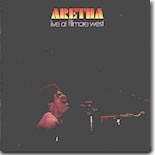 They were magical years, the early '70s. The Beatles, The Who and the
rest of the British Invasion had a hold on the popular music market.
Pink Floyd was starting it's amazing rise to fame, and soul music was
flourishing with Wilson Pickett, Joe Tex, Al Green and Aretha Franklin.
It was during this time that Atlantic Records executive and producer
extraordinary Jerry Wexler toyed with the idea of having Aretha
Franklin cross over to a wider audience. It was decided that there
was no better place to try it at than the Fillmore West in San
Francisco, an audience accustomed to seeing The Grateful Dead, Janis
Joplin and Grace Slick and The Jefferson Airplane. As the song goes "if
you can make it there, you can make it anywhere", of course the song
referred to New York, but to capture the attention of the long hair
hippy audience, the Fillmore West was an adventurous start. As the liner
notes state, bringing Aretha was not logistically easy. The venue wasn't
large enough to accommodate the number of concertgoers that could
guarantee Aretha and her band the $20,000 fee per show she was used to
receiving at this juncture in her illustrious career. The only solution
to the problem was to record the concerts for a live album. She was
persuaded to use King Curtis and The Kingpins as the backup band, and
the rest is history.
They were magical years, the early '70s. The Beatles, The Who and the
rest of the British Invasion had a hold on the popular music market.
Pink Floyd was starting it's amazing rise to fame, and soul music was
flourishing with Wilson Pickett, Joe Tex, Al Green and Aretha Franklin.
It was during this time that Atlantic Records executive and producer
extraordinary Jerry Wexler toyed with the idea of having Aretha
Franklin cross over to a wider audience. It was decided that there
was no better place to try it at than the Fillmore West in San
Francisco, an audience accustomed to seeing The Grateful Dead, Janis
Joplin and Grace Slick and The Jefferson Airplane. As the song goes "if
you can make it there, you can make it anywhere", of course the song
referred to New York, but to capture the attention of the long hair
hippy audience, the Fillmore West was an adventurous start. As the liner
notes state, bringing Aretha was not logistically easy. The venue wasn't
large enough to accommodate the number of concertgoers that could
guarantee Aretha and her band the $20,000 fee per show she was used to
receiving at this juncture in her illustrious career. The only solution
to the problem was to record the concerts for a live album. She was
persuaded to use King Curtis and The Kingpins as the backup band, and
the rest is history.
Live At The Fillmore West (Atlantic / Rhino) is a two disc set,
the first reprising the original LP release in it's entirety and the
second disc covering alternate takes and previously unused songs, so
great tracks like "Call Me", "Love The One You're With," a tune this
audience was familiar with since its writer was crowd favorite Stephen
Stills, and Ashford and Simpson's "You're All I Need To Get By" have
finally seen the light of day. Many songs are repeated on both discs,
such as her classic "Respect," "Dr. Feelgood" and "Spirit in The Dark."
At one point she is joined by Ray Charles on "Spirit" and history is
made once again.
Franklin closed the concert with "Reach Out And Touch Somebody's Hand,"
inviting the audience to join hands in a gesture of unity. The rock
loving audience was taken to an exalted level never before experienced
by many in the crowd. My own favorite was her incredible version of
Simon and Garfunkel's "Bridge Over Troubled Water." It doesn't get any
more righteous than this. If you love Aretha and want to capture her at
the very zenith of her career, this release is indispensable.
--- Alan Shutro
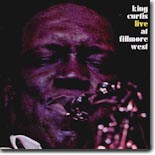 As a companion release to Aretha Franklin's Live at The Fillmore West,
Atlantic also chose to record King Curtis live, the same nights
they recorded Aretha's album. This release is a single disc as compared
to the two disc set they gave Aretha, probably because there were
shorter sets by him. It covers the complete LP release with only five
extra bonus tracks, four of which are alternate takes, with only George
Harrison's "My Sweet Lord" being new to the original release.
As a companion release to Aretha Franklin's Live at The Fillmore West,
Atlantic also chose to record King Curtis live, the same nights
they recorded Aretha's album. This release is a single disc as compared
to the two disc set they gave Aretha, probably because there were
shorter sets by him. It covers the complete LP release with only five
extra bonus tracks, four of which are alternate takes, with only George
Harrison's "My Sweet Lord" being new to the original release.
These were three momentous nights for both the performers and the
audience alike, featuring the Queen of Soul at her absolute best, and
premier saxman King Curtis, a highly influential musician, whose own
popularity had grown during his tenure with Atlantic Records. That
successful run ended tragically with his murder in August 1971. The
record was originally released in July 1971, several months after
Aretha's set went gold, topping the R&B charts and making the Top 10 Pop
listings, while King Curtis' LP became his best selling album ever,
reaching #9 on Billboard's R&B chart and finally cracking the Top 60 pop
charts, a major accomplishment for an R&B performer in those days.
King Curtis' Atlantic releases were always soulful, middle of the road
pop-sounding albums, and a quick glance at the titles sort of confirms
that opinion. It opens with a classic bit of churning southern funk,
"Memphis Soul Stew," which became his signature tune. It's followed by
soulful but pop-ish Procol Harem's "A Whiter Shade of Pale" and Led
Zeppelin's "Whole Lotta Love." They are followed by two soul numbers,
Jerry Butler's "I Stand Accused" and Buddy Miles' "Them Changes."
After those it's back to the pop tune hit parade with "Ode To Billy
Joe," which was made famous by Bobbie Gentry, and Jerry Jeff Walker's
"Mr. Bojangles." After a fine version of Stevie Wonder's "Signed Sealed
Delivered (I'm Yours)," the original release closed with another
signature King Curtis tune, "Soul Serenade."
A brief quote from the liner notes accurately comments on both these
releases. "Both Fillmore West albums were undoubtedly jewels in
Atlantic's revered '70s black music catalog, and both were acclaimed by
mainstream music critics and fans. Famed writer Dave Marsh noted in a
four star review for The Rolling Stone Album Guide that Curtis the
bandleader is at his absolute best....The powerful communication these
players had with each other produces a set that is a model of
intelligent choices made without sacrificing spontaneity." For those
'70s soul aficionados, or for those who love the sound of a great tenor
sax, you can't go wrong with this release.
--- Alan Shutro
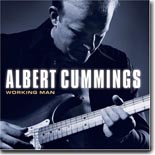 A very soulful bluesman. That was my
initial impression of Albert Cummings after listening to his new
Blind Pig release, Working Man. It’s an impression that has
stayed with me over several spins of his new CD. Compassionate vocals
and intricate guitar work indicate that Albert is a guitarist who works
hard at his craft and the result is a very enjoyable record.
A very soulful bluesman. That was my
initial impression of Albert Cummings after listening to his new
Blind Pig release, Working Man. It’s an impression that has
stayed with me over several spins of his new CD. Compassionate vocals
and intricate guitar work indicate that Albert is a guitarist who works
hard at his craft and the result is a very enjoyable record.
“Working Man Blues,” a song written by
Merle Haggard opens the record and it’s the only song that Albert didn’t
write on the CD. Albert himself is a working man, having grown up in New
England, and a 4th generation home builder. Working hard is
what he knows and “Working Man Blues” pays homage to everyone who works
hard for a living. We go from working hard to love gone bad in “Say You
Love Me.” “I tried so hard baby…to believe all of your lies..now I’ve
checked out your stories…they don’t match your alibis!” So even though
she says she loves him….its obvious she doesn’t. Cumming’s guitar work
is impeccable and it’s obvious early on in this record that he’s worked
hard to master his Strat.
“I Feel Good” finds Albert in a much
better frame of mind having won the love of a good woman. “I feel good
and it’s all because of you….look at you baby….oh…man you know you sure
look fine!” Obviously beautiful and loving, it sounds like our man has
found a keeper to hold on to. The funky intro to “Girls to Shame” is
hard to ignore given the backbeat provided by drummer Steve Potts. He
and bassist Dave Smith give the song a solid bass beat that will have
everyone up and dancing. And the girl herself, well…she’s just fine! “As
I look around the room….you put all the other girls to shame!” Albert
likes this one and that’s cool.
Intricate solo guitar work highlights the
painful “Let Me Be.” A slow ballad about the woman he drove away…all
Albert did was want to love her. “Life goes on baby…but my heart will
never feel the same…baby I’m still crying…every time I hear your name.”
We’ve all been there at one time or another…there’s one painful love in
everyone’s past that’s just too hard to let go of. “Feeling End” finds
the girl still on Albert’s mind. “Now I feel like I lost my best friend
and I wonder….how many more days until the feeling ends?” I find myself
empathizing with Albert’s sense of loss and moved by the pain he feels.
Fortunately, mood and energy change with
“Party Right Here.” “Just leave your worries behind…cause now is the
perfect time….get yourself a nice cold beer…a cold, cold beer…let’s have
a party right here!” “Party Right Here” finds the band in perfect form
and gives the song an infectious energy you can’t help but love. “I’m
Free” finds Albert venturing out on his own for the first time in a long
time. Loves gone bad, the relationship was too confining, whatever the
reason it’s time to move on and be single again. “Life goes on…I wish
you well….whatever happens next only time will tell…you left me with no
choice but to leave you all alone….now I’m better off…on my own!....Now
I’m free…..free at last….free of my past!” Nuff said.
Things slow way down again on “First Day”.
“What makes you laugh…what makes you cry…what are the things you
identify…with who you are deep inside…just let those things be your
guide…to your life.” “First Day” is definitely my favorite song on
Working Man, a song about living your life to the fullest. Albert is
letting his woman know that each day is important….to believe in
herself….that being who she is…is enough. “Cause tomorrow is….the first
day of the rest of your life.” This feeling of celebration continues
with “I’m on My Way.” Hard work and effort have paid off in setting
Albert on the path he wants to follow and it’s all good. “Don’t try to
tell me…that there’s something I can’t do…after awhile I’ll make a
believer out of you…I’m on my way!”
“Rumors” is another ballad that features
the strong back-end of Potts and Smith and confirms that this is a trio
who has played together for a long time. Albert’s woman has been
cheating on him and he’s trying to put the rumors to the rest…”you and
that man the other night…now you’re trying to tell me nothing’s
wrong…now you know baby…that just ain’t right.” The band’s versatility
continues with the shuffle, “Please.” Albert is trying to re-kindle a
romance gone bad…”please baby, won’t you let me back in……we’ll start all
over again!” Unfortunately for Albert, the girl wants nothing more to do
with him.
The ballad, “Last Dance,” closes out what
has been a very enjoyable contemporary blues album. “It’s the last song
of the evening…I’ve been waiting all night…for the time to be right….to
ask you dance.” This is a woman Albert definitely feels is very special
and he’s walking on eggshells trying to figure out a way to approach
her. Now that she’s agreed to dance with him…”I hope this song goes on
forever…so you and I can be together….as if no one else was on the
floor…you’ll be mine and I’ll be yours…may I please have this dance?”
I find that Working Man is an
excellent representation of an artist I haven’t heard a lot about.
Ballads like “Feeling End,” “First Day” and Last Dance” are perfectly
balanced by songs like “Working Man Blues,” “Party Right Here” and
“Please.” Jim Gaines produced this record for Albert Cummings and his
masterful talents only highlight what is probably one of the top three
or four contemporary blues albums I’ve heard all year. Now that I’ve
been exposed to the music of Albert Cummings, I hope to see him soon. He
fronts a very tight trio and we all should take the time to witness a
live performance by a performer who should be with us all for a very
long time.
--- Kyle Deibler
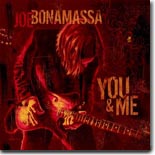 Joe Bonamassa is full
of surprises. I’m not sure what I was expecting, but his new record,
You & Me, recently released on the Premier Artists imprint, features
reworked versions of songs by Charley Patton and Sonny Boy Williamson to
go along with tunes from Ry Cooder, Jimmy Page and Robert Plant, as well
as Joe himself. The result is an assault on the senses that definitely
lets me know that “this isn’t my daddy’s kind of blues!” But make no
mistake about it, this is blues!!!
Joe Bonamassa is full
of surprises. I’m not sure what I was expecting, but his new record,
You & Me, recently released on the Premier Artists imprint, features
reworked versions of songs by Charley Patton and Sonny Boy Williamson to
go along with tunes from Ry Cooder, Jimmy Page and Robert Plant, as well
as Joe himself. The result is an assault on the senses that definitely
lets me know that “this isn’t my daddy’s kind of blues!” But make no
mistake about it, this is blues!!!
Bonamassa opens up with his version of the Patton classic, “High Water
Everywhere.” Originally written to describe the Mississippi flood of
1927, Bonamassa conveys the same sense of desperation that
Mississippians had to have felt back then. “Well there’s high water
everywhere, Lord the river overflowed…50 men and children..watch them
sink and drown!” Depression gives way to frustration in “Bridge to
Better Days.” Joe’s woman is decidedly high and mighty and for some
reason wants little to do with him. “You sit in your big house baby, you
drive your fancy car…you treat me like I’m not there..but I guess that’s
who you are…I’m on a bridge to better days!” Moving on and moving out is
definitely preferably to being treated like a dog and it’s good that Joe
moved on.
“Asking Around For You” slows things down and is a pretty ballad about a
sweet love. “I’ll tell the angel on my shoulder that I’ll be asking
around for you... If I get to heaven now oh I’m praying now…it’ll be the
first thing I do…I’ll tap an angel on the shoulder and I’ll be asking
around for you!” Bonamassa is a brilliant guitarist and his solo in
“Asking Around For You” just lights up my speakers with the passion of
his love for this woman. Another ballad, “So Many Roads,” is about the
traveling life. “So many roads…so many trains to ride..I’ve got to find
my baby before I’m satisfied.” Bonamassa’s fretwork continues to shine
in this version of the Paul Marshall classic.
The pace picks back up in “I Don’t Believe.” Fine piano work by Rick
Melick intersperses with Joe’s guitar as he refuses to believe that his
relationship is over. “I don’t believe..I don’t believe you found
somebody else…yes but when I needed you baby… you left me on the shelf!”
Joe should have believed. I find Bonamassa’s rendition of the Ry Cooder
traditional, “Tamp Em Up Solid,” to be particularly indicative of Joe’s
blues roots and proof positive that his foundation runs deep. The dobro
picking is exquisite and gives the song a very realistic old time feel
in the way it was intended. “Tamp Em Up Solid” is the one cut I find
myself playing over and over just to appreciate the subtlety of what I’m
hearing.
“Django” stands in contrast as an anthemic opportunity to display the
band’s multiple talents. A strong bass line from Carmine Rojas and
drummer Jason Bonham supports Joe’s clear guitar leads. It’s a very
powerful song and an interesting instrumental addition to the record.
Following ‘Django” with “Tea For One” by Jimmy Page and Robert Plant
makes perfect sense musically though it feels a touch out of place on
this record. The band is in full force and more than does the song
justice musically as Joe sings about time passing by. “How come over 24
hours just seem to slip into days?” At just over 9½ minutes long though
I have to admit it began to lose me as a listener.
Fortunately, the intricate almost flamenco style picking on “Palm Trees,
Helicopters and Gasoline” quickly brings my attention to the record back
into play. It’s a nice short instrumental that is a welcome respite to
the sheer length of “Tea For One.” “Your Funeral And My Trial” spins
life in a different fashion. “I love my baby got to see her when I
can…found my baby messing with another man…cause if you can’t treat me
no better…your funeral and my trial”. “Your Funeral And My Trial”
features some amazing harp playing by 12-year-old LD Miller. I’ve not
heard of Miller before but he blows a very mean harp and almost steals
the song from Joe.
Bonamassa closes the record with a very powerful rendition of the
self-penned song, “Torn Down.” “One more cross to bare…one more road I
ride…one more night in the city….no more living lies…..I won’t be torn
down!” Whatever the evils are that tear at his soul, he’s had enough and
is going to stand strong!
You & Me is one of the more intriguing records I’ve had a chance
to review this year. Joe Bonamassa’s treatments of classics by Charley
Patton, Paul Marshall, Sonny Boy Williamson and the traditional by Ry
Cooder are blended with edgy blues originals that do nothing but add to
Bonamassa’s legend as a guitar player. This is not my daddy’s blues and
in some cases it may not even be considered our kid’s blues, but give
credit to Joe Bonamassa for pushing the boundaries of blues and giving
us one artist’s interpretation of where it can go. We may not always
follow his muse but it’s important that we all take the time to listen
to it. Blues needs this kind of exploration and give credit to Joe
Bonamassa for being willing to take us on this journey as an artist.
--- Kyle Deibler
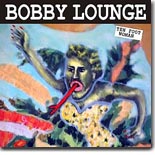 I reviewed Bobby Lounge’s first disc not so positively (I
Remember The Night Your Trailer Burnt Down,
December ’05 issue of Blues
Bytes). Review of the review was civil if disagreeable.
I reviewed Bobby Lounge’s first disc not so positively (I
Remember The Night Your Trailer Burnt Down,
December ’05 issue of Blues
Bytes). Review of the review was civil if disagreeable.
With Lounge's new disc, Ten Foot Woman, I listened to every note
and every word to be thorough, and it was easier than the first disc, as
was hoped.
With this second CD, the mystery of Bobby’s first release unfolds
slightly. There’s an acoustic guitar on two tracks in addition to
Lounge’s piano/voice, his territory in the credits is suggested to be
Abita Springs, LA. His website,
www.bobbylounge.com
is an absolute hoot, which really sets the stage for this tortured soul.
His rusty razorblade voice is exactly the same as on his first disc and
you have to admire him for consistency, including album artwork.
Intense story-telling is promised on the first track, but as selections
progress, listener fatigue sets in quickly because each one is performed
in the same key. In place of sardonic wit he lives in the problem with
no suggested solution, other than “I don’t care.”
“Do Your Duty” is one of a handful of non-originals on the CD, this one
timeless. “Take Me To Angola” and “Don’t Pity Me” are basically say the
same --- things just plain happen to people, and some aren’t born with
common sense. The lyrics about nude photos of himself, mentioned in both
selections, plus the penchant for wearing a dress in one, can’t be
honesty for therapy’s sake. And they contain no more media shock value
than Janet Jackson’s wardrobe malfunction.
It’s really the gospel selections where Lounge fares best, neither of
them originals, and both making his view of religion clear. One of them
“minors” his singular key, adding a much-needed break. Throughout, his
piano really is felicitous, he’s a great player, plus the
top-conditioned instrument is well-recorded as on the first disc.
Then we get to the concluding title track and finally hear something
everyone can enjoy. The lyrics are very well put together, as in the
ideal physic he seems to be after. This could be a hit by Lounge or
anyone capable of covering it.
And there’s late-breaking news --- Bobby is getting a booking agent and
may do a few shows in the northeast. Of course, he will have the iron
lung on stage.
--- Tom Coulson, Broadcaster/Musician
Communication:
mailto:tcoulson@ktar.com
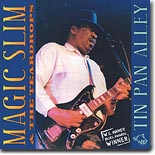 Tin Pan Alley, from Magic Slim and the Teardrops, is
released on the Wolf label, lesser-known than other labels Magic Slim
has recorded for, like Blind Pig and Alligator. The source material is
half Chicago and half Vienna. It’s labeled “W.C. Handy Blues Awards
Winner” on the cover, presumably for the disc. It’s archived all-live
stuff done in the mid-late ‘90s when his long-time bassist Nick Holt was
still on-board.
Tin Pan Alley, from Magic Slim and the Teardrops, is
released on the Wolf label, lesser-known than other labels Magic Slim
has recorded for, like Blind Pig and Alligator. The source material is
half Chicago and half Vienna. It’s labeled “W.C. Handy Blues Awards
Winner” on the cover, presumably for the disc. It’s archived all-live
stuff done in the mid-late ‘90s when his long-time bassist Nick Holt was
still on-board.
This is a very good thing, as Slim has since rotated younger players
into and out of his quartet that just don’t have the trademark shuffle
beat down that is required for his raw party blues. This Teardrops
recording is far superior to others lately and would serve as an
excellent introduction to the Mississippi/Chicago blues leader’s style.
Not a lot of variety in the tempos, words or chord progressions, but the
shuffles are in the pocket where they belong. And the sonic qualities
among the sessions are as rough as his music, both of which work for
blues.
It’s probably not the absolute best Magic Slim album of all time, but
it’s a lot better than many. Grade of A.
--- Tom Coulson, Broadcaster/Musician
Communication:
mailto:tcoulson@ktar.com
It's Tight Like That, from Jeff Healey & the Jazz Wizards with
Chris Barber is not only the blind blues guitarist of great renown but
also a Toronto, Ontario figure who plays jazz guitar, trumpet, and has
a vintage music show on superstation Jazz FM 91 in his home town. It was
upon hearing his broadcast that I became acquainted, before hearing his
playing. On the radio he loves to talk, plays stuff direct off 78 RPMs
like Armstrong, Bechet, Lonnie Johnson and the like. Therefore this disc
on Canada’s Stony Plain Records was anticipated so one could hear the
other side of Healy.
It’s promoted as “Making old music fresh and alive and thoroughly
contemporary,” but it’s the style, not the musicianship or effort here,
that leaves me cold. Excellent production notwithstanding, it seems to
serve as a preservation of yesteryear. Contemporary? Maybe to a
90-year-old Dixieland fan. As for jazz, I gravitate to bop and beyond,
so please note that discrimination. This could very well be the best
release of the year in its category for all I know.
And it does contain many blues forms. It has high-spirited advantages
and will not bring moods down. Vocals are original and confident. Make
no mistake: This music is toe-tapping, bass-slapping, and “garden party”
refined, not blood-pumping, bump-and-grinding, “in-the-alley” raw. So
its application may be key. The addition of veteran Brit Chris Barber,
by the way, is notable. He had a huge hit in the States in the ‘60s,
“Petite Fleur,” still heard in oldies rotation. It’s great to hear
his extended and very mature trombone playing among the solos.
--- Tom Coulson, Broadcaster/Musician
Communication:
mailto:tcoulson@ktar.com